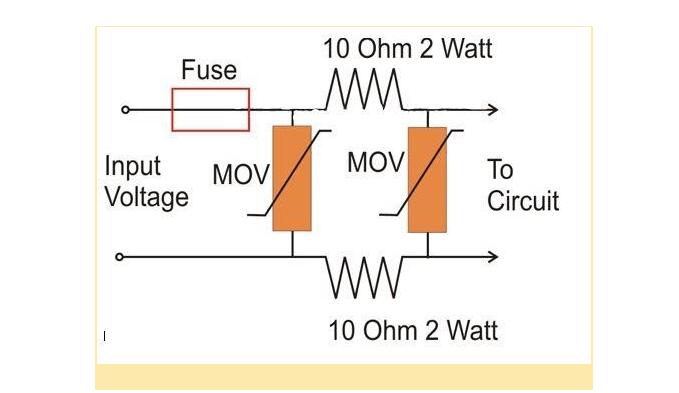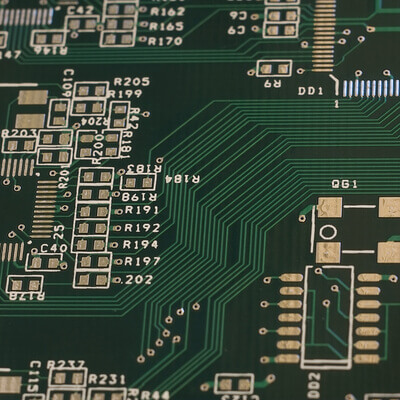Contents
- Meaning and Principle of Surge Protector Circuits
- Types of Surge Protector Circuits
- Primary Surge Protector
- Secondary Surge Protector:
- Power Strips
- Uninterruptible Power Supply or UPS:
- Designing Surge Protector Circuit
- Using MOV or Metal Oxide Varistor
- Properties of MOV
- Required Component of MOV
- Surge Protector Circuits in Automotive Systems
- Properties of Surge Protector Circuits in Automotive Systems
- Required Components
- RFI Line Filter and Surge Suppression Circuit
- Properties of RFI Line Filter and Surge Suppression Circuit
- Required components of RFI Line Filter
- Difference Between Surge Protector and Circuit Breaker
- Conclusion
Meaning and Principle of Surge Protector Circuits
The surge protector is an electronic device that negates lesser electric current. In addition, it also transients that continuously appear in the central utility lines.
They operate by quickly short-circuiting any peak voltage that appears in the major AC power circuit.
Here is a video explaining how to protect high voltage spikes using a surge protector.

Special Offer: Get $100 off your order!
Email [email protected] to get started!
Types of Surge Protector Circuits
There are two common types of surge protector circuits, which are
Primary Surge Protector
Primary surge protection is devices that you can install anywhere. These include the entrance of an office, house, or building electrical wiring. It protects every electrical appliance or equipment which connects the line beyond the entry point. The primary power surge protector is strong. Besides, it is heavy, big and also costly.

A type of surge protector circuit with indicators placed at the entrance of a hospital
Secondary Surge Protector:
Contrariwise, a secondary surge protector is not as costly and effective as a primary surge protector. However, it is convenient, easy to move, and fits into an external power outlet. Moreover, it protects the electrical appliances from getting current from the power outlet connected. Nevertheless, there are other types of secondary surge protector devices, namely;
Power Strips
These are secondary surge protectors that connect with an electrical channel. Moreover, power strips have many channels for the connection of various electronic devices. Likewise, if an electrical surge happens, the power strip will cut the power. However, this sometimes leads to a power outage. Nonetheless, it is the most beneficial characteristic to prevent damage to the devices.

A reservoir type of secondary surge circuit with a built-in surge protector and circuit breaker in a restaurant
Uninterruptible Power Supply or UPS:
This is another kind of secondary surge protector. A few intricate power UPS possess a built-in power surge protection device. Also, it offers similar safety features in comparison to power strips.

A UPS surge protector circuit buoying temporary surges in voltage
Designing Surge Protector Circuit
There are different ways to design a surge protector circuit:
Using MOV or Metal Oxide Varistor
It is easy to design a surge protection device. Some electrical equipment only requires a single protective device, a Metal Oxide Varistor (MOV).
Properties of MOV
- Metal Oxide Varistor (MOV) is a voltage-dependent resistor
- It works as a surge protection device in power lines.
- Further, its working principle can be similar to TVs or bidirectional transient voltage suppressors.
- Also, it serves as an open circuit for low clamp voltage.
- Besides, the workings of MOV are similar to a non-ohmic, non-linear diode with the features of a directional voltage.
Circuit Diagram

Required Component of MOV
- A heavy semiconductor material (usually sintered granular zinc oxide) that conducts a large current.
- A piece of metal oxide connected to the grounding and power line
- Limit voltage to about three or four times the normal circuit
- Matched MOVs connected in parallel to raise half-life and current capability.
As a leading China PCB manufacturer, OurPCB specializes in designing and manufacturing surge protector circuits tailored to your specific requirements. With expertise in integrating components like MOVs and TVS diodes, OurPCB ensures precise layouts and reliable performance for surge protection applications.
Surge Protector Circuits in Automotive Systems
Transient surges can cause damage to the communication buses, hydrolytic controllers, and engine-cooling systems. Also, valves, motors, and more in automotive systems. The protection devices in automotive systems can either be Transient Voltage Suppressors (TVS) or Zener diodes.
Properties of Surge Protector Circuits in Automotive Systems
- Zener diodes used for protection against load-dump surges
- Produced from semiconducting ceramics
- TVS protect communication buses
- TVS reduce the surge current with low clamping voltages
- They are compatible with wave-soldering and modern reflow procedures.
- The surface-mount package gives the designer space savings over the larger footprint of plastic-housed components.
Circuit Diagram

Required Components
- The current waveform for the surge is 8/20µs
- Limit of forty surges
- A maximum of 250V sensitive device that requires protection.
- Peak surge current of about 800A
- Current input of 24V DC
RFI Line Filter and Surge Suppression Circuit
This design is perfect for drying for a major AC line filter circuit. This offers combined protection against RFI suppression and sudden voltages.
Properties of RFI Line Filter and Surge Suppression Circuit
- The RFI circuits are usually a broadband kind of filter circuit.
- The RFI line filter comprises a small ferrite transformer with some capacitors.
- The transformer blocks and arrests the passage of any outgoing or incoming RFI across the line.
- The capacitor network strengthens the efficiency by grounding the high excess frequency across the line.
- Developed above the two small ferrite rods wrapped around each other is a transformer.
- One of the winding end connections switches between the output/input Neutral line.
Circuit Diagram

Required components of RFI Line Filter
The filters comprise a device containing parallel capacitive (non-load bearing). Also, series inductive (load-bearing) components or a circuit. The component offers a low circuit path around the protected circuit for high-frequency noise.
Besides, the filters similarly attenuate simulation. This is because Fourier's analysis of a spike will show that it contains current waveforms. Therefore, the surge suppressor and filter work together when connected.
Difference Between Surge Protector and Circuit Breaker
Power circuit breakers and current surge protectors are both protection technology. However, there are differences between the two.
Also, it is necessary to have power circuit breakers. This is a panel with built-in circuit breakers your house or office requires. The function of the circuit breaker is to prevent the overloading of the circuit. This may result in overheating and finally an explosion. Also, they have amp circuit breaker-protected adapters to provide additional safety. The small red button in the alarm control panel will pop when there is a current overload. Once found and fixed, you can put it back and get back to work. Besides, it will similarly save you the trouble of going to the service panel.
Electrical surge protectors, on the other hand, prevent electrical appliances from voltage spikes. A voltage surge is when an appliance or cord exceeds the voltage rating. This can lead to the destruction of your electronic appliances. Power strips such as PSROT-072 are common in public places. Often, you will have entertainment systems, computers, air conditioners, office appliances, and plugged TVs. Nevertheless, a downed power line or a lightning strike is the most common cause of a spike in voltages. Surge protective devices are advisable. However, they are not made compulsory by the community regulations or the state.
Conclusion
From the information, it is clear that surge protection devices are vital for the safety of our electrical devices. With these devices, it is possible to prevent damage voltage surges cause. Besides, it helps by providing more accessible outlets to you. Simultaneously, it saves money as you only need a button or knob to control several devices. You can get the protector device of any design from our company. Kindly contact us for more information.
Special Offer: Get $100 off your order!
Email [email protected] to get started!





